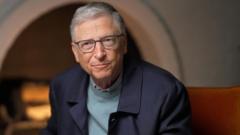In a candid conversation, Gates discusses the $100 billion donated to combat poverty and disease, his childhood influences, and the impact of neurodiversity on his career.
Bill Gates: The Philanthropic Journey of a Technology Titan

Bill Gates: The Philanthropic Journey of a Technology Titan
Bill Gates reflects on his immense charitable contributions and personal growth in a recent interview, revealing his plans for continued philanthropy.
Bill Gates, the Microsoft co-founder and renowned philanthropist, has disclosed that his charitable foundation’s donations have surpassed $100 billion, but he believes there's still more he can contribute. During an exclusive interview with the BBC, Gates clarified that his philanthropic efforts, valued around £80 billion, are comparable to the entire economy of Bulgaria or the complete construction cost of the HS2 rail line in the UK.
With his wealth estimated at $160 billion according to Bloomberg's Billionaires Index, Gates expressed that despite giving away substantial amounts, the lifestyle he leads has remained largely unchanged. "I made no personal sacrifice. I didn't order fewer hamburgers or sudden less movies,” he remarked humorously, while also confirming that he continues to enjoy the luxuries afforded by his wealth, such as private jets and multiple residences.
Gates elaborated on his intentions for the future, stating he aims to donate "the vast majority" of his fortune while engaging his children in discussions about what inheritance is appropriate. "They will not be poor" after his passing, he assured, acknowledging that though they may not receive a large percentage of his fortune, they will still be financially secure.
Reflecting on his childhood, Gates recounts his upbringing in Seattle, where he excelled in mathematics early on. Recalling the supportive role of his mother, who instilled a sense of responsibility in him regarding wealth, he attributes his competitive nature to family dynamics, especially the influence of his grandmother.
In his new memoir, "Source Code: My Beginnings," Gates delves into his early life, offering insights into his formative years and the challenges of feeling different. Interestingly, Gates shared his perspective on potential neurodiversity affecting his life and career, suggesting he may align with autism spectrum traits, a view endorsed by his sisters. "The positive characteristics for my career have been more beneficial than the deficits have been a problem for me,” he stated, emphasizing the value of hyperfocus in his tech success.
As he reminisces about formative moments like sneaking out of his bedroom to access computers, Gates balances his genius with vulnerability, admitting challenges in social interactions. The interview also touches on pressing social issues, including the importance of regulating social media to protect children and his stance on misinformation regarding vaccines.
Despite his privileged upbringing, which afforded him access to technology that shaped his career, Gates acknowledges that early life experiences significantly influenced his ambition and philanthropic vision. For him, the journey from a tech prodigy to a powerful benefactor symbolizes the belief that "much of who you are was there from the start."
As Gates continues to write the narrative of his life and contributions, his ongoing commitment to using his wealth for global betterment remains clear, marking him as a significant figure in both technology and philanthropy.



















